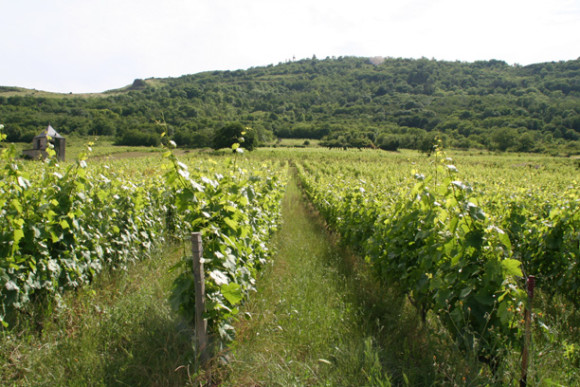
Lindsey Wallace, an American student on junior year abroad, travels through the countryside and reflects on the meaning of home.
By Lindsey Wallace
As I have grown older my perception of home has changed. Not just from moving around in general, but from the experiences of coming to college, traveling, meeting new friends, and having family that are now far away from my physical home address—Paris right now—but that still give me the same feeling of warmth, love, and comfort when I think of them.
Even smells, tastes, sounds can be home. The dusty smell of old books when I breathe in the scent just along their spine always brings me back to weekends at my grandmother’s house, sitting inside on rainy days playing with old Legos on the library/living room floor. The smell of lavender reminds me of homemade lavender apple sauce my Mom would make on cool summer nights, blinking fireflies lighting up the purple Southern sky.

But one home changes to another, past hearths are forgotten and filed away in the dusty troves in the back of the mind. It’s only been this semester, living in Paris, that I’ve begun to understand that my past homes have never truly left me – rather, they lie hidden, waiting to be stirred in the most curious of ways.
Recently I was awakened by the smell of lilies. I had up and been out of bed hours before, but the overwhelming perfume snapped me to my senses after a somnolent four hour-long bus ride from Paris to the Loire Valley. A white castle loomed in the distance, dripping with ivy-covered willow trees and framed by the halo of the golden morning sun. Pink and ivory roses perched regally on the path to Chateau Azay-le-Riveau in the Loire valley, the first stop on 28-hour whirlwind tour of the Loire chateaux.
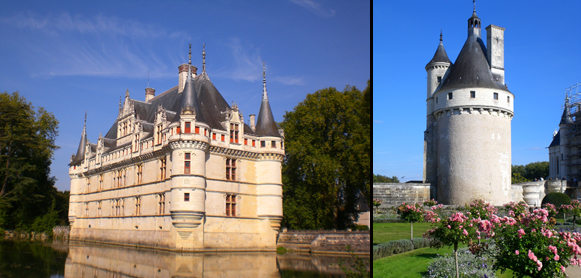
The Loire Valley is one of the most visited tourist destinations in France, and for good reason. Often called the “Garden of France,” the region boasts of ethereal beauty in the form of rolling vineyards and countryside, glorious flowers and gardens, and of course, its majestic chateaux (over a thousand in the region!).
Enchanted by the mystery and beauty of these antique wonders of stone, we hurried through five chateaux in less than two days, promenading through whispering gardens of lavender and silky roses, living labyrinths of greenery in eerie clearings, wandering in amazement through echoing halls of stone, elaborate rooms where kings, queens, and more scandalous subjects lived and died.
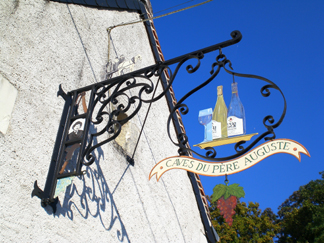 Out of all the enchanting sights, tastes, and sounds that weekend, a tiny stone cottage, barely visible from the road, enthralled me most of all. That was where we went for a wine tasting at a local vineyard, “Les Caves du Père Auguste,” the owner of which was only a boy when his grandfather had planted the vines himself. The tips of his vines could be seen from beyond the cave where his wine matured.
Out of all the enchanting sights, tastes, and sounds that weekend, a tiny stone cottage, barely visible from the road, enthralled me most of all. That was where we went for a wine tasting at a local vineyard, “Les Caves du Père Auguste,” the owner of which was only a boy when his grandfather had planted the vines himself. The tips of his vines could be seen from beyond the cave where his wine matured.
As we drove away from the tiny home and garden, I remembered the petite French town where I had lived as a child, and a wave of quiet longing swept over me for my own childhood vineyard sanctuary.
I was nine when we moved to France, to Clermont-Ferrand, in the Auvergne region, the world capital of the tire company Michelin. Downtown Clermont was grey and industrial but my village, Pérignat-lès-Sarliève, lay on the edge of Clermont, in a nestled valley of quiet greenery and lavender-perfumed wind, near le Puy-de-Dôme (the mountain on the front of Volvic water bottles), and directly in front of the Plateau Gergovie, where Chieftain Vercingetorix gave Julius Caesar one of his only military losses. My street, “Rue des Vignes,” got its name, “Road of Vines,” from the ocean of emerald that lay behind it – the beautiful vineyard of my childhood.
Below is a view from my home in Pérignat towards the Plateau Gergovie. If you look closely you can see the tiny triangle monument to Vercingetorix on top of the Plateau.

I’m not sure what it was about the vineyard—it felt like such a sacred place, especially in the morning, in the sunrise. I would sit, mouth open tasting the softness of morning as the sunlight filled my eyes, my lungs. Dewy drops glinted off the birth of the day, bursts of golden sunlight swirling into waves of auburn, ruby, amber-rose, jasper and pink pearlescence, washing across the leafy vines, bathing them in jeweled rainbow light. The vineyard seemed so alive in the sunlight, the leaves swaying in symphony to the singing wind and rising ever so slowly to the warmth of the gently coaxing sun.
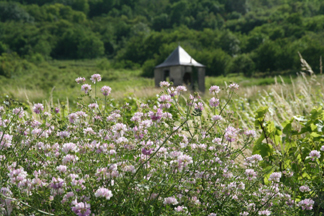 As I sat in the Loire Valley, delicately swishing white wine in my glass, listening to the old man tell the story of his grandfather, I felt the true warm embrace of home for the first time since arriving in Paris. I left the Caves du Père Auguste with bittersweet taste in my mouth, and not from the dry red I had just sampled; it felt like I was leaving Pérignat and my beautiful vineyard all over again.
As I sat in the Loire Valley, delicately swishing white wine in my glass, listening to the old man tell the story of his grandfather, I felt the true warm embrace of home for the first time since arriving in Paris. I left the Caves du Père Auguste with bittersweet taste in my mouth, and not from the dry red I had just sampled; it felt like I was leaving Pérignat and my beautiful vineyard all over again.
I realized, then, that although we may leave them, our homes never leave us—they lie quietly, waiting for us to feel them with a breath of contented recognition and fall into their arms once more.
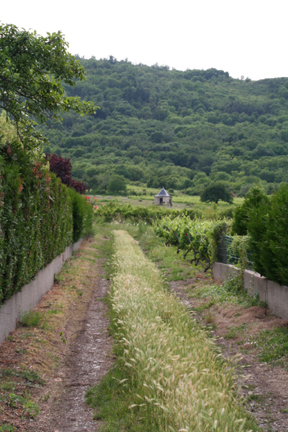 Home, then, is not one singular place, but rather a collection of memories—tastes, sights, sounds, hopes and dreams from the past and present. So though we move on in our lives—move away, move forward—we never lose our past. We are never really away from home after all.
Home, then, is not one singular place, but rather a collection of memories—tastes, sights, sounds, hopes and dreams from the past and present. So though we move on in our lives—move away, move forward—we never lose our past. We are never really away from home after all.
And so I found home yet again in the beautiful countryside of France—a country that remains my home. Feeling the warm sun on my face as I gaze out the Loire tour bus window, watching the bright leaves of vineyards as they pass by, I closed my eyes. For a moment I was home again in Pérignat, in a different time – ten years old in my flowered sundress, running, laughing, through the maze of vines that was (and always will be) my home.
Lindsey Wallace is a junior at Duke University and is in Paris for the fall semester.


Nice the way you wove your childhood memories in there.
You are a gifted writer! I look forward to reading more of your blogs.